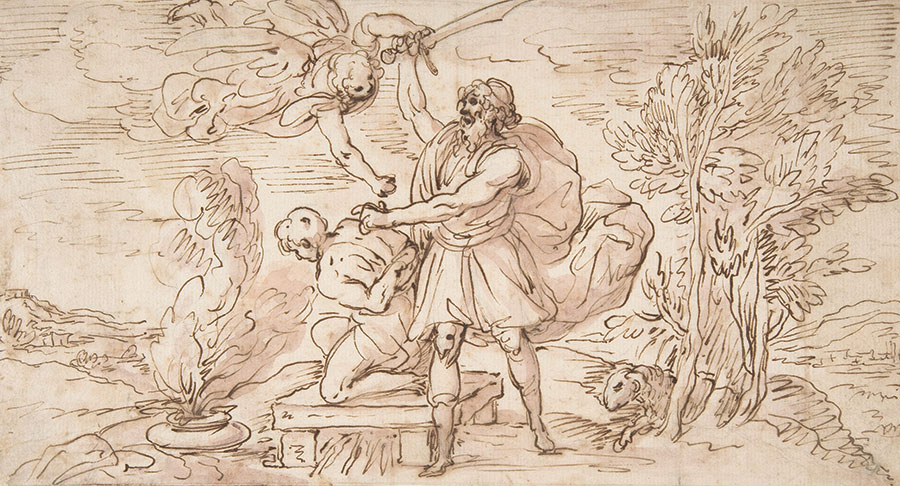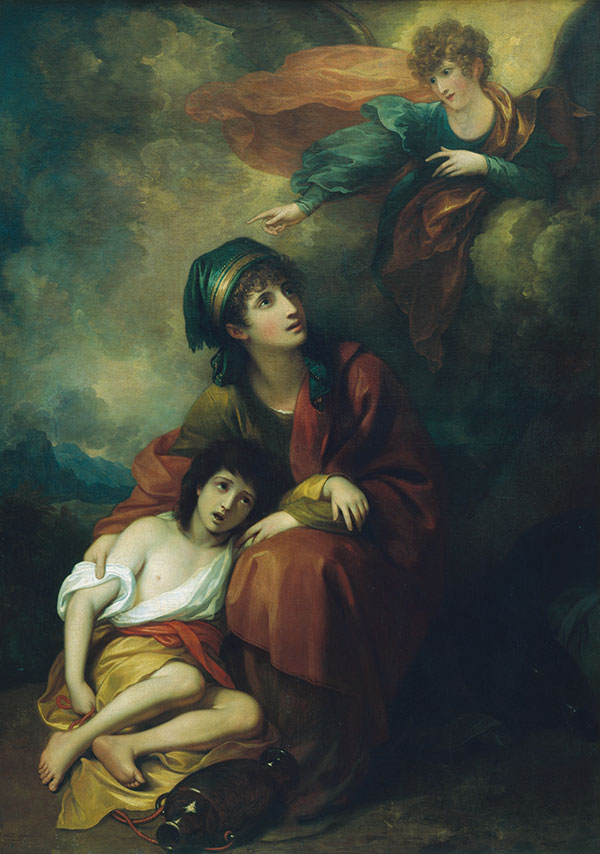“The One You Love”? A Case of Divine Disappointment
“Take your son, your only son, the one you love, Isaac” (Gen. 22:2). The medieval commentator Rashi famously quotes a midrash (Gen. Rabbah 55:7; BT Sanhedrin 89b) that explains God’s curious fourfold command by imagining these words as one-half of a dialogue:
“Your son.” [Abraham replied,] “I have two sons.” He said to him, “your only son.” He [Abraham] said, “This one is an only child of his mother and that one is an only child of his mother.” He [God] said to him, “the one you love.” He [Abraham] said to Him, “I love both of them.” He [God] said to him, “Isaac.”
The midrash endows the verse with dramatic tension: a resistant Abraham doesn’t know and doesn’t want to know which son he is to take; an insistent God spells it out for him: take the son that you love; take Isaac. But is Isaac, in narrative fact, the son whom Abraham loves? Is he the son whom Abraham loves best? If he is, should God have to tell him so? In short, is it Abraham—or God—who favors Isaac?
As we look with fresh eyes at this all-too-familiar story, I suggest we take our cue from another rabbinic tradition. This tradition assigns the story of the banishment of Ishmael as the Torah reading for the first day of Rosh Hashanah, positioning it as the backdrop against which to consider the binding of Isaac (Akedat Yitzchak), which is read on the second day. What can we learn from the juxtaposition of the two tales?
A few chapters earlier in Genesis, in the covenant between the pieces (Gen. 15), God promises Abram a child, his own biological child. Sarai, Abram’s barren wife, knows nothing of this promise; neither God nor, as far as we know, Abram shares the news with her. Out of her sheer desperation to give Abram a child, Sarai proposes that he have a child with her Egyptian maidservant Hagar. In Genesis 16 a child is born to Abram and Hagar. Is this the promised child through whose descendants Abram would one day become a great nation? Abram didn’t consult God before acceding to Sarai’s wishes, nor does he turn to God after his child is born. This child, as it turns out, is not the one God promised Abram. He is a wild man whose “hand will be in everything [bakol] and the hand of all in him” (Gen. 16:12).
In the following chapter, God changes Abram’s name to Abraham and Sarai’s name to Sarah and informs Abraham that he will have a son with Sarah. Abraham laughs: Is it not ludicrous, bizarre, for a man of a hundred years and a woman of ninety to bear a child? But is his laugh also joyful? Is he elated? Is it not strange that, upon hearing the wondrous news of a second son to be born to him, the first words Abraham addresses to God are: “Would that Ishmael live before You” (Gen. 17:18)?
God persists: “But your wife Sarah is going to give birth to a son; you will call him just Isaac; and I will establish My covenant with him as an eternal covenant with his children after him” (Gen. 17:19). Only by way of concession to Abraham’s concern—“And regarding Ishmael I have heard you” (Gen. 17:20)—does God promise to make Ishmael into a great nation and the father of twelve princes. God does not, however, let the matter rest there. He reiterates: “It is with Isaac that I will establish My covenant, Isaac whom Sarah will bear you at this time next year” (Gen. 17:21). The passage concludes as follows: “He [God] was done talking to him, and God arose from above Abraham.” God has set Abraham straight: He will see to it that Ishmael has a dynasty and a legacy, but it is Isaac with whom He will establish His everlasting covenant.
Upon receiving the astonishing news about a second son, Abraham circumcises his first son, Ishmael, and the other males in his household. Although God issues a general directive that all the males in Abraham’s household be circumcised, the biblical text, perhaps seeing the circumcisions from Abraham’s perspective, sets Ishmael apart, informing us that Abraham circumcised “Ishmael his son and all those born in his house or purchased” (Gen. 17:23). Three verses later (Gen. 17:26), it is said, yet again, that “Abraham and Ishmael his son” were circumcised on that very day. Moreover, in this verse the singular verb is used for the circumcision of father and son; for the others, the plural is used. This repeated emphasis and the use of the singular verb seem to be telling us that for Abraham, the covenantal ritual represents the bond not only between him and God but also between him and his first son, Ishmael.
In Chapter 21 the son whom God has promised Abraham and Sarah is born. Even though the promise and the prediction were made to Abraham, we are told that this child is born because God “remembered Sarah” (Gen. 21:1). God, it would seem, knows that it isn’t Abraham who longs for this child. Abraham prayed for a child but not for this child. When he prayed for a child, it was not in Sarah’s presence, nor, it seems, directly for her sake. He did not pray that God would open her womb; he prayed because he wanted a son. These small details take on greater significance when compared with the way that his son Isaac will later pray for a child. Isaac prays for a child in his wife’s presence; he prays for a child for Rebekah, who is barren. God answers Isaac’s prayer, and Rebekah conceives (Gen. 25:21). Isaac’s birth, by striking contrast, was not an answer to Abraham’s prayers.
After Isaac is weaned, Sarah sees Ishmael “fooling around” (metzachek). The verb plays on Isaac’s name (itself a pun on the laughter of his parents at the prospect of having a child at their advanced age) and is later used for what the Israelites were doing when they worshipped the golden calf (Ex. 32:6). It is not clear what Ishmael was doing, but whatever it was, Sarah doesn’t like it. She instantly views him as her son’s rival. Refusing to call Ishmael Abraham’s son—and not even calling Isaac his son—she says to Abraham: “Banish this bondwoman and her child; for the bondwoman’s child will not inherit with my son, with Isaac” (Gen. 21:10). This thing (ha-davar) that Sarah asks of Abraham is “very bad in his eyes” and for only one reason: “on account of his son” (Gen. 21:11).
God’s reprise of Abraham’s reaction subtly reframes his displeasure: “Don’t let this be bad in your eyes,” He says, “because of the lad [ha-na‘ar] and your bondwoman” (Gen. 21:12). Note that Abraham has not found it simply bad; he has found it very bad. And he was distressed not because of “the lad” but “on account of his son,” and he was not at all disturbed over Sarah’s bondwoman.
Abraham should listen to Sarah, God continues, because it is Isaac’s line that will carry his name. But Abraham’s concern, once again, is for Ishmael, and so God reassures him: “And I will also make the bondwoman’s son a nation, because he is your seed.” “The bondwoman’s son”? And “your seed”? It is almost as if God cannot bring Himself to say that Ishmael is Abraham’s son—and not just Hagar’s; Abraham’s son—and not just his seed. Taking pity nevertheless on Abraham, God promises him that Ishmael will survive and become a great nation. As in the announcement of Isaac’s birth, here, too, Abraham and God are at odds.
Abraham gets up early the next morning, and although one could say that he does so to do God’s bidding promptly, it is not as if on this occasion God has asked Abraham to do something for Him. Rather, God has instructed him to listen to Sarah. Neither God nor Sarah suggests that Abraham give Hagar and his son bread and water for the journey; this is something he does on his own initiative, early in the morning.
Once Hagar and the child are gone, God hears Ishmael’s cry. Now the text seems to view Ishmael through God’s eyes: he is no longer “the child,” as he was when seen through the eyes of his parents, Abraham and Hagar (Gen. 21:14-16), but “the lad,” the term God had used for him (Gen. 21:12). What is arguably a term of endearment is replaced by a generic designation. After God hears the cry of this lad, He delegates His angel to deal with the situation. The angel of God calls to Hagar from the heavens and tells her that God has heard the cry of “the lad” where he is and instructs her to lift him up because “I will make him into a great nation.”
The first verse of Genesis 22 tells us that “God put Abraham to the test.” What was God testing? Were Abraham’s faithfulness and obedience to God still in doubt? Or was God perhaps testing something else? Might God have been testing Abraham’s love for his son with Sarah, Isaac?
Once again Abraham arises early, but this time it is to do God’s will. Instead of bread and water, he takes his two servants (“his lads”) and his son. He then splits wood for an offering and “gets up and goes” to the place that God has told him. Getting up and going connotes alacrity, not the resistance we might expect. There is no displeasure recorded and no protest. Abraham is not described as finding what he has been asked to do “very bad.”
When Abraham sees the designated place from afar, he says to his young servants, “Remain here with the donkey, while I and the lad go on ahead; we will worship and return to you” (Gen. 22:5). We should be jarred, I think, by this use of the phrase “the lad” in a narrative that uniformly refers to Isaac as “your son” or “his son.” Abraham’s anonymous servants are also called “his lads.” In the previous chapter, Ishmael was “the lad” from God’s perspective, while from Abraham’s, Ishmael was “his son” or “the child.” Now, from Abraham’s perspective, it is Isaac who is “the lad,” while from God’s he is “your son, your only son, the one you love.”

Abraham takes the wood for the offering, places it on his son Isaac, takes in his hand the fire and the knife, “and they went on together” (Gen. 22:6). Abraham has kept the truth from Isaac; they go on “together” only because Isaac does not know where they are going. But suddenly Isaac senses that something is amiss. “My father,” he says, to which Abraham responds, “Here I am, (hineni) my son” (Gen. 22:7). And Isaac asks, “Here are the fire and the wood, but where is the lamb for the offering?” to which Abraham responds, “God will see to the lamb for the offering, my son” (Gen. 22:8). Only when Isaac addresses Abraham directly as “my father” does Abraham respond, “my son.”
When Abraham says “here I am” to God, or, later, to the angel, he signals his attentiveness. When he speaks the identical word to his son, however, what follows is, at best, a dodge. The verse concludes: “And they went on together.” It would seem that it is only because Abraham keeps the truth from his son that they can go on together—as an evasive father and a trusting son.
As soon as father and son arrive at the designated place, Abraham constructs an altar, arranges the wood, and binds Isaac his son. He then takes the knife to slaughter him. No hesitation is recorded. The total lack of affect in Abraham is stunning, particularly compared with his great distress at having to merely send Ishmael away.
Now the angel calls out Abraham’s name, twice, before Abraham responds, “Here I am.” We may suppose that Abraham is so thoroughly engrossed in the task at hand that he fails to hear the first call of his name. But if he is a father being put to the most terrible test of sacrificing his only son, the one whom he loves, why isn’t he waiting, hoping, praying for such a call? When he lifts up his eyes and sees the ram caught in the thicket, the text says, “And behold” (Gen. 22:13), indicating that the ram is a surprise. And note that it is a ram—not a lamb. Abraham was not prophesying in assuring his son that God would provide the offering; he was hedging.
The angel tells Abraham not to put his hand forth to “the lad.” The term “lad” has returned, the term Abraham—not God or the biblical narrator—had used to refer to Isaac. The angel, representing God and speaking in his voice, is thus acknowledging at last that from Abraham’s perspective it is this son who is “the lad.”

Allow me to revisit another classic question with fresh eyes: Why an angel? God is the one who has summoned Abraham to this most awful task. Why does He now delegate the climactic moment to his angel; why is it the angel who speaks God’s words: “Now I know that you are God-fearing, having not withheld your son, your only son, from Me” (Gen. 22:12)? Perhaps the angel steps in because God has stepped away, disappointed, from this coolly compliant patriarch.
God’s final capitulation to the painful truth that Abraham prefers Ishmael becomes manifest when the angel omits the expression “the one you love, Isaac” from the formula God had used to designate Isaac. The angel does not say “your son, your only son, the one you love, Isaac”; he stops after “your only son” (and this occurs twice, at Genesis 22:12 and 16). Through his angel, God has at last acknowledged that Abraham does not now—and will not ever—favor Isaac. Abraham may love Isaac, but Isaac is not the son he loves.
Abraham finds the ram and sacrifices it, and he calls the place “the Lord will see.” Why is the name he chooses so bland? Why not a name that expresses his overwhelming joy and relief or his profound gratitude to God for sparing his son?
Although there can be no question that Abraham is, as the angel pronounces, a God-fearing man, one who “obeyed Me” (Gen. 22:18), the test Abraham faced was not, for him, the ultimate test. The son he was in fact asked to sacrifice was not his favorite but only, as the angel says, “your son, your only son.” The thing (ha-davar) for which the angel commends Abraham, namely, that he did not withhold his only son from God, recalls the other thing (ha-davar)—the banishment of Ishmael—which, unlike the Akedah, was “very bad in his eyes.”
God is surely disappointed in Abraham. He says nothing more to him here—or ever again. Indeed, the last words God speaks directly to Abraham are the ones with which He tests him: “Take your son, your only son, the one you love, Isaac.” God fulfills His promises to Abraham, but there is no further personal contact. What God didn’t want to see, He now cannot help but see. What He didn’t want to be the case, He now sees is the case: Abraham does not share God’s preference for Isaac. That God and Abraham never do see eye to eye on which son is worthy of favor may well be the source of the final rift between them.
There is a rift, too, between Abraham and Isaac. Abraham comes down the mountain by himself: he returns alone—the verb used is in the singular. Once Isaac knows what his father has intended, they no longer go on “together.” It is now Abraham’s young servants—“his lads”—with whom Abraham goes on “together” (Gen. 22:19).
Although we are not told where Isaac was when his mother died, we do know that he loved her, finding no solace for her death until he brought his new bride into his mother’s tent (Gen. 24:67). The Torah gives us no indication that Isaac was similarly inconsolable after his father’s death.
Abraham is the only person the Torah calls a lover of God—not God’s beloved, but the one who loves God (Isa. 41:8; 2 Chron. 20:7). The traditional morning prayers preserve this description of Abraham as well: “But we Your nation, the children of Your covenant, the children of Abraham who loves You.” So, too, the High Holiday service: “Our Lord will remember for our sake the love of His tenacious one,” referring to Abraham. Yet it is surely not on account of the binding that Abraham is called “the one who loves Me.” For what God “knows” about Abraham at the end of the binding is only that Abraham is “God-fearing.” Many other biblical figures are God-fearing: Joseph, the Hebrew midwives, Job, Hananiah, and even, occasionally, the Israelite people. What is it then that qualifies Abraham as a lover of God? Perhaps it is, after all, his willingness to banish Ishmael, his son, his only son, the one he loved (best).
The preference for one child over another or others is a theme that pervades Genesis, beginning with God’s preference for Abel over Cain. It is noteworthy that after Abraham’s death, the Torah tells us that “God blessed Isaac his son” (Gen. 25:11), and although this is followed by a list of the descendants of Ishmael, there is no similar mention of Ishmael’s receiving God’s blessing. God favors Isaac, the son of Sarah; Ishmael is merely the son of the bondwoman Hagar—and Abraham’s seed. Isaac is destined to repeat the sin of his father, as children often do. His preference for Esau over Jacob is contrary to both God’s preference and Rebekah’s; it leads to deception. Jacob, in turn, will prefer the son of the good-looking woman he loved—a preference destined to have calamitous consequences.
The heart in its desperate yearning for a child, the eye in its helpless attraction to beauty, the belly in its gustatory craving—these determine and sometimes pervert human choices and preferences. People favor whom they favor—not necessarily those who merit favor nor those whom God would favor. In this respect, even Abraham disappoints God.
One final note: the Torah may obliquely confirm that the son Abraham wanted, the one he considered his blessing, was Ishmael. Genesis 24:1 reads: “And Abraham was old, advanced in years, and the Lord blessed Abraham in everything” (bakol). Only one son is associated in the Torah with the phrase “in everything.” It is not Isaac but Ishmael, of whom it is said: “His hand is in everything [bakol] and the hand of all is in him” (Gen. 16:12).
Comments
You must log in to comment Log In
Suggested Reading

Take Your Son . . .
A new book about the interpretation of the most terrifying verses in the Hebrew Bible.
The Idea of Abrahamic Religions: A Qualified Dissent
What is "Abrahamic" about Judaism, Christianity, and Islam?

Haman, Builder of Towers, Brother of Abraham?
A new book raises the possibility that interpretive motifs from within both Jewish and Islamic traditions might have led to the uniquely Islamic tradition that Abraham and Haman were brothers.

Ink and Blood
Arthur Szyk may well be the only great Jewish artist whose work countless people recognize simply because they have attended a Passover Seder. Less well known are the explicit connections between the Egyptian pharaoh and Hitler that Szyk had embedded in his original version of the haggadah he created in the 1930s.
J. Black
A real eye opener article, though I wish the story was never part of the bible.
Rabbi Jonathan Gerard
Every congregant I've ever discussed the Akedah with has told me they believed that Abraham FAILED the "test." But it seems to me that the take away message is that Abraham finally learns God's message: if you ever think you hear Me telling. you to sacrifice your child on the altar of your beliefs, know that it is NOT Me but your own ego speaking. Don't push your child to follow in your career footsteps; let him or her pursue their own path in life. The ordeal Is made to be this dramatic because the lesson is so important: No child sacrifice ever pleases God.
Gershon Ben-Avraham
Wow! What a gestalt. Thank you.